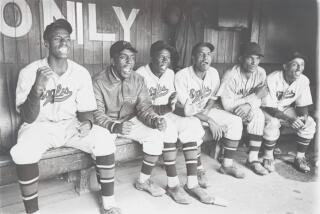Bulls still bask in Hollywood glory
- Share via
DURHAM, N.C. -- The bull still snarls from atop the outfield wall, snorting smoke after home runs and taunting hitters with four simple words written on it: Hit bull, win steak.
The replica of the prop Hollywood built for “Bull Durham” is larger and glitzier than the original -- and in that way, it’s like nearly everything else about today’s Durham Bulls.
Exactly 20 years have passed since the film hit theaters on June 15, 1988, and the modern-day Bulls bear little resemblance to the fictionalized crew portrayed on film by Kevin Costner and Tim Robbins. No longer a small-town team with a run-down ballpark mired in the sleepy Carolina League, these Bulls play in a major-league-quality stadium and, as Tampa Bay’s triple-A affiliate, are one step from “The Show.” Yet they’re well aware why they’re one of the minor leagues’ biggest names.
“Without that movie, I don’t believe minor league baseball is as strong as it is today,” Bulls General Manager Mike Birling said. “That was kind of the piece that really got minor league baseball moving again.”
Especially the Bulls, who never would have catapulted to fame had ex-minor league second baseman Ron Shelton not placed Durham in his film, which spends a year with the then-Class-A club and stars Costner as an aging catcher, Robbins as a hotshot pitching prospect and Susan Sarandon as the fan wooed by both.
The film’s sharp dialogue, timeless scenes and believable on-field action wound up sending the Bulls into the national consciousness.
“Ron wrote a beautiful screenplay and it was really up to us to try to serve it, protect it, add to it in whatever way we could that made sense to Ron, and then Ron protected it as a director,” Costner said. “That’s what happens if you get some classic writing. . . . Films are supposed to have some staying power. All too often they don’t, but they’re supposed to.”
This one did. Two years after the film’s release, the Bulls became the first Class-A team to break the 300,000 attendance mark, then in 1998 became a triple-A team. Along the way, they’ve established themselves as one of the minors’ annual leaders in merchandise sales, and set a franchise record last year by attracting 520,952 fans to their 13-year-old, 10,000-seat stadium.
And not a week goes by, Birling said, that a tourist doesn’t walk past the “Bull Durham” movie poster hanging outside the team’s offices and ask for directions to the 70-year-old Durham Athletic Park, where fictional fireballer Nuke LaLoosh plunked the mascot with a fastball, and infielders and a pitching coach gathered on the mound to discuss wedding presents.
“The movie is still part of our history, and definitely still in a positive way,” Birling said. “It’s more that minor league baseball has kind of changed from the way the movie portrayed -- riding buses, the tough life of minor leaguers -- with new stadiums nowadays and the way the players are treated.
“Just the whole family entertainment aspect of it, it’s just evolved. But without that movie, I don’t see minor league baseball being as successful as it currently is. We’re just very proud and happy to have been a part of that.”
The film, in which journeyman Crash Davis (Costner) and spiritual fan Annie (Sarandon) groom LaLoosh (Robbins) into a major leaguer, has been called one of the best sports movies of all time. Athletes have been known to quote lines back to the actors and assign the characters’ nicknames to their teammates -- Robbins says players have told him their teammates call them “Nuke” or “Meat.”
Shelton, who also directed the film, praised it as “a catalyst in the rebirth of the minor leagues,” largely because its appeal extends well beyond baseball -- and beyond Durham.
While the movie has a distinct North Carolina flavor -- from the picturesque ballparks shown during the Bulls’ road trips to the downtown bar in nearby Raleigh that was the site of a memorable fight scene -- it could just as easily take place today in Toledo, Albuquerque or any other minor league city where there are washed-up players, rookies and groupies.
“It was a reminder for a lot of people that there are other things at work with baseball, and that it is our national game, and there’s a lot to be proud about it,” Robbins said. “There’s a lot of poetry and a unique spirit to the game. There’s some really beautiful writing in the movie about the game itself, and so I think on a more important level, it kind of reminds people what they loved about baseball.”
Shelton chose Durham as the setting because of its small-town charm and its access to ballparks in nearby Greensboro, Burlington and Wilson, and across the state in Asheville.
“Durham was sort of the black sheep of the cities of North Carolina, in my view as a kid,” said producer and Durham native Thom Mount.
“It had gone through a tough civil rights experience, it had a calamitous failure of its downtown business district, it had been battered in the declining portions of the tobacco industry and textile industry, and it gave us a chance to make something that, in its making, carried some of the fondness that we grew to have for what the city stood for.”


